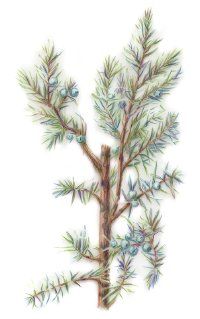In addition to medicinal applications, the distinctive flavor of the juniper berry has been used for centuries. Did you know that it's the main flavor ingredient in gin?
Uses of Juniper
With their warming, stimulating, and disinfecting actions, juniper berries have many medicinal uses. Juniper berries have an antiseptic effect and are often used in cases of chronic and repeated urinary tract infection. They are used in between flare-ups in those with frequent infections but not for acute cases of bladder infection.
Advertisement
Juniper stimulates urinary passages, causing the kidneys to move fluids faster. This is helpful if your kidneys are working sluggishly (such as with renal insufficiency) and if urine is not flowing freely. But such stimulation would be disastrous if you had a raging kidney infection. Because of the myriad dangers, juniper must be used judiciously, starting with small, cautious dosages, and only under the supervision of an experienced practitioner. It also may be used for prolapse and weakness of the bladder or urethra.
Because juniper is indicated for chronic conditions associated with debility and lack of tone in the tissues, it is most often used for treating older people or those with chronic diseases. Both the aging process and prolonged disease are associated with loss of tone in tissues and organs. Since juniper is stimulating, it is useful in these situations.
Juniper berries also are recommended for joint pain, gout, rheumatoid arthritis, and nerve, muscle, and tendon disorders; the plant is used internally and topically for such complaints. Take small doses of juniper mixed with other herbs, such as ginger, for a month at a time; then abstain for a week to 10 days before restarting.
Juniper's volatile oils have been concentrated and used topically for coughs and lung congestion. Its tars and resins have been isolated and used topically to treat psoriasis and other stubborn skin conditions. This treatment may irritate the skin, so you should dilute it and gradually increase the concentration. In both topical therapies, juniper has a warming, stimulating, and slightly irritating action.
Juniper also is considered to be a uterine stimulant, occasionally used by herbalists to improve uterine tone and late or slow-starting menstrual periods. Juniper is valuable for respiratory infections and congestion because the volatile oil in its berries opens bronchial passages and helps to expel mucus. Juniper's volatile oils also relieve gas in the digestive system and increase stomach acid when insufficient. Hydrochloric acid in the stomach is required to digest food, and insufficient acid leads to incomplete digestion, gassiness, and bloating.
Keep reading to learn about preparations and warnings for juniper.
To learn more about treating common medical conditions at home, try the following links:
- For an overview of all of our herbal remedies, go to the main Herbal Remedies page.
- To learn more about treating medical conditions at home, visit our main Home Remedies page.
- One of the best things you can do for your health and well being is to make sure you are getting enough of the vital nutrients your body needs. Visit our Vitamins page to learn more.
This information is solely for informational purposes. IT IS NOT INTENDED TO PROVIDE MEDICAL ADVICE. Neither the Editors of Consumer Guide (R), Publications International, Ltd., the author nor publisher take responsibility for any possible consequences from any treatment, procedure, exercise, dietary modification, action or application of medication which results from reading or following the information contained in this information. The publication of this information does not constitute the practice of medicine, and this information does not replace the advice of your physician or other health care provider. Before undertaking any course of treatment, the reader must seek the advice of their physician or other health care provider.Before engaging in any complementary medical technique, including the use of natural or herbal remedies, you should be aware that many of these techniques have not been evaluated in scientific studies. Use of these remedies in connection with over the counter or prescription medications can cause severe adverse reactions. Often, only limited information is available about their safety and effectiveness. Each state and each discipline has its own rules about whether practitioners are required to be professionally licensed. If you plan to visit a practitioner, it is recommended that you choose one who is licensed by a recognized national organization and who abides by the organization's standards. It is always best to speak with your primary health care provider before starting any new therapeutic technique.
Advertisement
